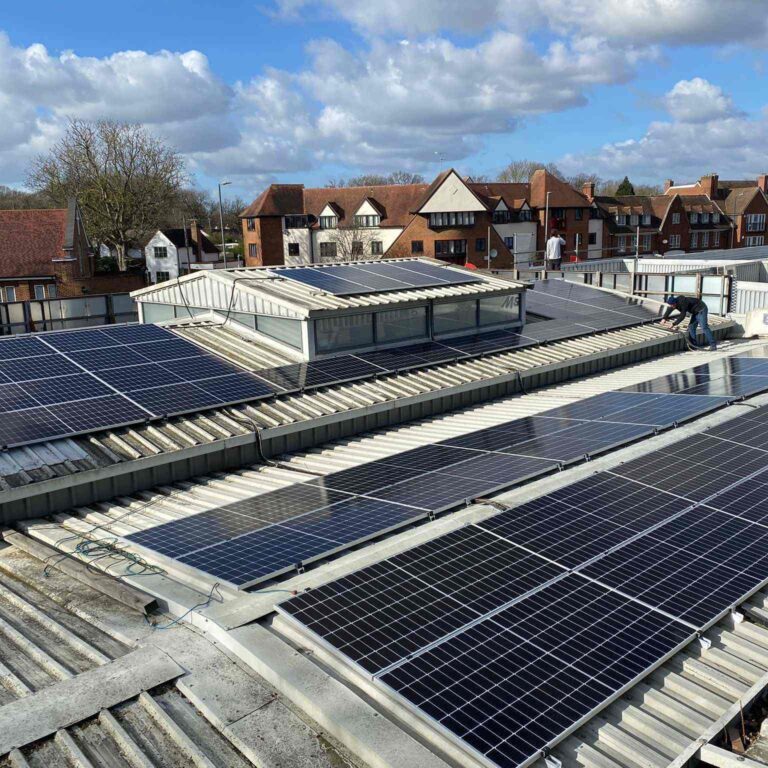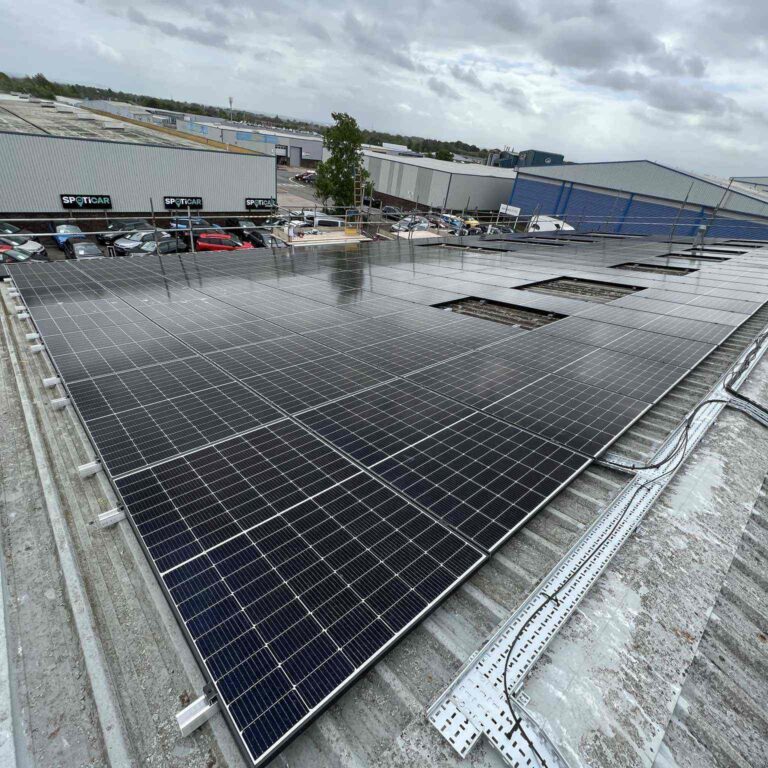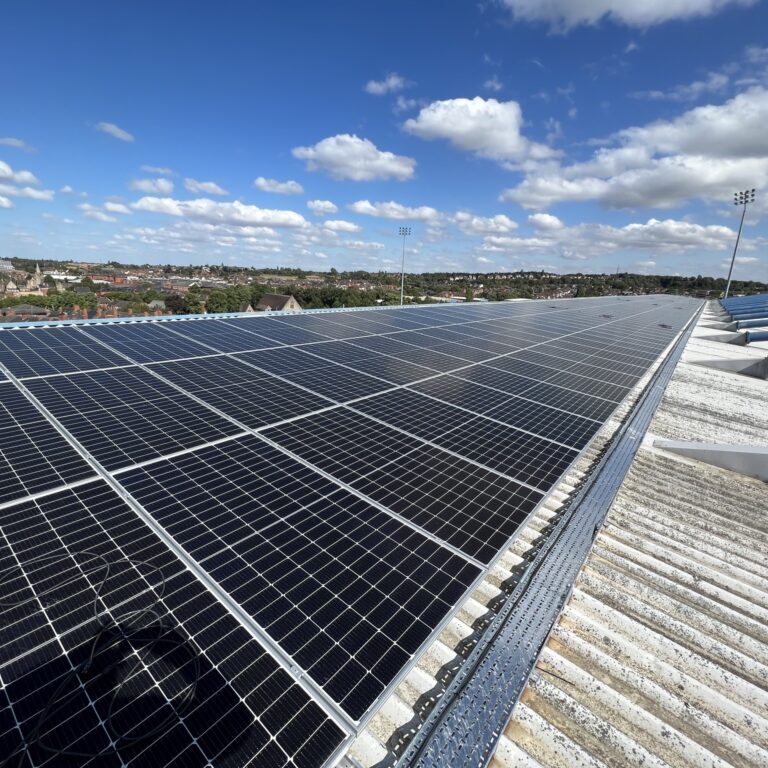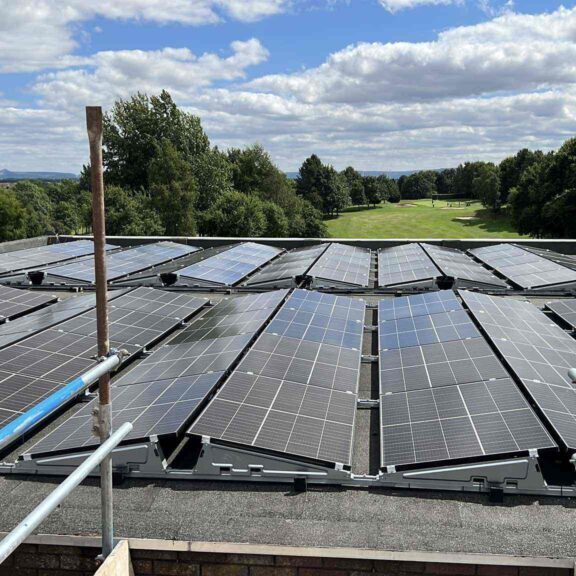As the demand for sustainable energy solutions continues to grow, more UK businesses are turning to commercial solar energy as a way to reduce their operational costs and meet their corporate sustainability goals. Among the various sectors benefiting from this shift, warehouses stand out as prime candidates for solar panel installations. With vast rooftop spaces and high energy consumption, warehouses are uniquely positioned to capitalize on the advantages of commercial solar energy. In this article, we will explore the unique needs and benefits of installing commercial solar for warehouses, and what UK businesses need to know to make the most of this opportunity.
Why Warehouses Are Ideal for Commercial Solar
Warehouses present a unique set of characteristics that make them ideal for commercial solar installations. The large, flat rooftops commonly found on warehouse buildings offer expansive space for solar panels, allowing businesses to install sizable systems capable of generating significant amounts of electricity. This is particularly advantageous for warehouses, which often have high energy demands due to lighting, heating, ventilation, and the operation of machinery and equipment.
Moreover, the nature of warehouse operations typically involves energy consumption during daylight hours, aligning perfectly with the peak production times of solar panels. This synergy between energy use and solar energy production enhances the efficiency and cost-effectiveness of commercial solar for warehouses.
Benefits of Commercial Solar for Warehouses
Investing in commercial solar for warehouses offers a range of benefits that go beyond simply reducing energy bills. Here are some of the key advantages that UK businesses can expect:
1. Significant Cost Savings
One of the most compelling reasons to consider commercial solar for warehouses is the potential for significant cost savings. Energy costs represent a substantial portion of operating expenses for many warehouses, and rising energy prices in the UK only add to this burden. By installing solar panels on warehouse rooftops, businesses can generate their own electricity, reducing their reliance on the grid and lowering their energy bills.
In many cases, the savings generated from solar energy can offset the initial investment in the system within just a few years, making it a financially sound decision in the long term. Additionally, businesses can take advantage of government incentives, such as the Smart Export Guarantee (SEG), which allows them to earn money by selling excess electricity back to the grid.
2. Enhanced Energy Security
Energy security is a growing concern for UK businesses, particularly in the context of fluctuating energy prices and the potential for supply disruptions. Commercial solar for warehouses provides a measure of energy independence by allowing businesses to produce a significant portion of their electricity on-site. This not only shields companies from price volatility but also ensures a more stable and predictable energy supply.
For warehouses that rely heavily on continuous operations, such as those involved in logistics and distribution, the ability to generate reliable energy can be critical to maintaining smooth and efficient operations.
3. Meeting Corporate Sustainability Goals
Sustainability is becoming an increasingly important consideration for businesses of all sizes, and commercial solar for warehouses offers a powerful way to meet corporate sustainability goals. By reducing their carbon footprint and reliance on fossil fuels, businesses can demonstrate a commitment to environmental responsibility, which is increasingly valued by consumers, investors, and regulatory bodies.
In addition to the environmental benefits, adopting solar energy can enhance a company’s brand reputation and provide a competitive advantage in a marketplace where sustainability is becoming a key differentiator.
4. Maximizing the Use of Unutilized Space
Warehouse rooftops often represent an underutilized asset. Unlike other commercial properties, warehouses typically have large, flat roofs that are not shaded by taller buildings or obstructions, making them perfect for solar panel installations. By converting this unused space into a productive asset, businesses can maximize the return on their property investments and turn their rooftops into a source of renewable energy.
5. Long-Term Investment in Property Value
Installing commercial solar panels on warehouse rooftops is not just an investment in energy savings; it’s also an investment in the long-term value of the property. Properties with solar installations are often more attractive to buyers and tenants who are looking for energy-efficient buildings with lower operating costs. As a result, warehouses with solar panels can command higher property values and rental rates, making solar energy a smart investment for property owners.
Key Considerations for Installing Commercial Solar for Warehouses
While the benefits of commercial solar for warehouses are clear, there are several key considerations that businesses need to keep in mind when planning a solar installation. These factors will help ensure that the system is designed and installed to meet the specific needs of the warehouse and deliver the expected returns.
1. Assessing the Structural Integrity of the Roof
Before proceeding with a solar installation, it’s essential to assess the structural integrity of the warehouse roof. Solar panels can add a significant amount of weight, so it’s crucial to ensure that the roof can support the additional load without compromising its structural stability. A thorough inspection by a qualified engineer should be conducted to identify any necessary reinforcements or repairs that may be required before installation.
2. Optimizing Panel Placement and Orientation
The placement and orientation of solar panels play a critical role in maximizing energy production. For warehouses in the UK, panels should ideally be installed facing south to capture the maximum amount of sunlight throughout the day. However, the specific orientation may vary depending on the building’s layout and any potential shading from nearby structures or trees.
In some cases, it may be beneficial to use advanced mounting systems that allow for adjustable panel angles, enabling the system to capture more sunlight during different times of the year.
3. Understanding Energy Usage Patterns
To design an effective commercial solar system, it’s important to have a clear understanding of the warehouse’s energy usage patterns. This includes identifying peak energy consumption times, understanding the energy needs of different operations, and estimating the potential savings that solar energy could provide.
Working with a professional solar provider who can conduct a comprehensive energy audit will help ensure that the system is tailored to the specific needs of the warehouse, delivering the best possible return on investment.
4. Navigating Government Incentives and Financing Options
The UK government offers various incentives and financing options to encourage businesses to adopt renewable energy solutions. These can significantly reduce the upfront costs of installing commercial solar for warehouses and improve the overall financial viability of the project.
For example, the Smart Export Guarantee (SEG) allows businesses to sell excess electricity generated by their solar panels back to the grid, providing an additional revenue stream. Additionally, businesses may be eligible for tax relief through the Enhanced Capital Allowance (ECA) scheme, which allows for 100% of the investment in solar energy to be written off against taxable profits.
Understanding and taking advantage of these incentives is key to maximizing the financial benefits of commercial solar for warehouses.
Choosing the Right Solar Provider
Selecting the right solar provider is one of the most important decisions in the process of installing commercial solar for warehouses. It’s essential to work with a provider who has experience in the UK market and a proven track record of successful installations in the commercial sector.
A reputable provider will offer a comprehensive service that includes initial consultation, system design, installation, and ongoing maintenance. They should also provide detailed financial projections and help navigate the various incentives and financing options available.
Conclusion: A Strategic Investment for UK Warehouses
Commercial solar for warehouses offers a unique opportunity for UK businesses to reduce their energy costs, enhance their sustainability efforts, and maximize the use of underutilized rooftop space. With the potential for significant cost savings, increased energy security, and improved property value, investing in solar energy is a strategic move that can deliver long-term benefits for warehouse operators.
By carefully considering the specific needs of the warehouse, optimizing the design and placement of solar panels, and choosing the right solar provider, businesses can ensure that their investment in commercial solar energy delivers the maximum return. As the UK continues to embrace renewable energy, warehouses that adopt solar power will be well-positioned to thrive in an increasingly competitive and environmentally conscious market.



